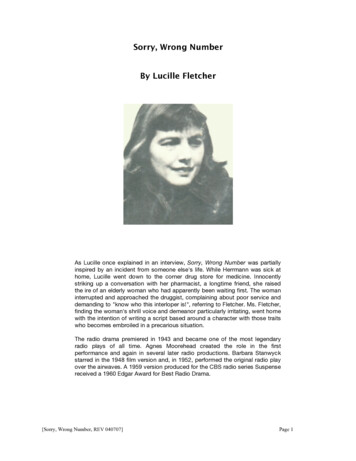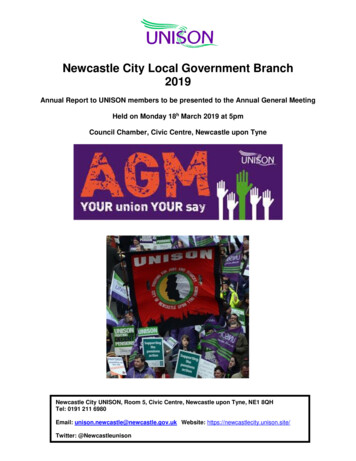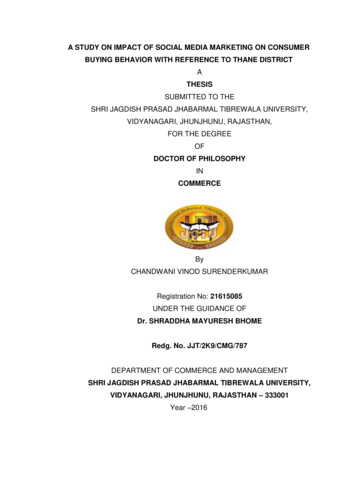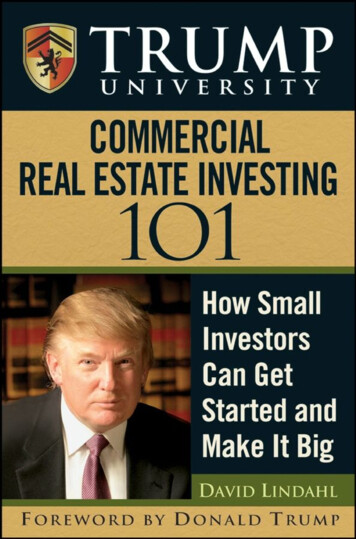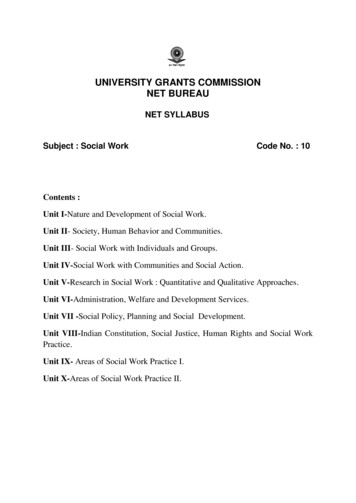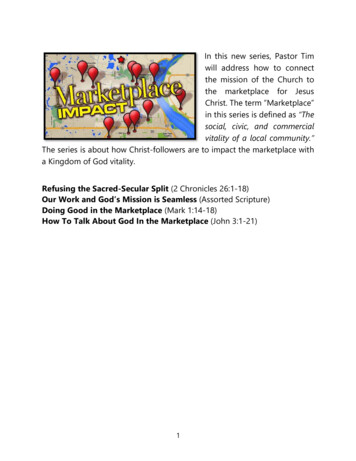
Transcription
In this new series, Pastor Timwill address how to connectthe mission of the Church tothe marketplace for JesusChrist. The term “Marketplace”in this series is defined as “Thesocial, civic, and commercialvitality of a local community.”The series is about how Christ-followers are to impact the marketplace witha Kingdom of God vitality.Refusing the Sacred-Secular Split (2 Chronicles 26:1-18)Our Work and God’s Mission is Seamless (Assorted Scripture)Doing Good in the Marketplace (Mark 1:14-18)How To Talk About God In the Marketplace (John 3:1-21)1
Refusing the Sacred-Secular Split(2 Chronicles 26:1–18)Mike Rowe has had more jobs than you or me. In fact, I think Mike has hadmore jobs than anyone. Mike Rowe is on the Discovery Channel's series DirtyJobs. He’s spent years traveling the country, working as an apprentice onmore than 200 jobs that most of us would go out of our way to avoid. FromRoadkill Collector to Maggot farming to Sheep castrating, Mike Rowe hasdone it. I’ve watched the show and my reaction is, “Man, I’m glad I’m apastor.” But I wonder if my attitude is right. We kind of think that God is onlyin what we might call “church activities.” We kind of think that there’s a splitbetween the sacred and the secular, but if that’s true, there’s a huge chunkof our lives that’s been left out of God’s plan for us.The average American spends about 40% of their total time working a job.And then there’s all the time spent doing hobbies, going to school,recreation, entertainment, shopping for groceries, going to a movie, andevery other life activity that. If we draw our circle too small on our Christianlife, we’ll create a split between the sacred and the secular; we live as if there’sa large percentage of our life that we say doesn’t matter to God. But the factis, God wants us to effectively live out our faith in Jesus Christ inside andoutside the church and into the marketplace of our community.So, as we begin a new series called, “Marketplace Impact,” I want to talk aboutthe fact that God didn't invent a sacred/secular split; we did that. Now, we’llsee this morning that the Bible talks about a sin/righteousness split and apride/humility split that can keep us from effectively influencing ourmarketplace for Christ, but this morning we’re going to refuse the sacredsecular split; we’re going to say that every part of our lives matter to God,and that every part of our lives are designed to be a sacred offering to himas we take Jesus with us into the marketplace. I have 3 insights, first.2
1. Determine to live on the right side of the splits. I mentioned that theBible does talk about splits and most of the time it can be categorized underthe title of a sin-righteousness split.I want show you from 2 Chronicles 26:1–18, an example of living on the rightside of the split. 790 years before the birth of Jesus, an Israelite king enteredinto this sin-righteousness split and for many years lived on the side ofrighteousness. His name was King Uzziah, and at the age of 16, he wascrowned king of Judah. Let’s read 2 Chronicles 26:4-5 (READ). Uzziah was onthe right side of the sin/righteousness split here. He did what was right in theeyes of the Lord; v. 7 says God helped him in his wars; v. 8 says, his famespread even to Egypt; v. 15 says, the LORD gave him marvelous help, and hebecame very powerful. The framework for all this is in v. 5: “ as long as theking sought guidance from the LORD, God gave him success.” And we see thisat work in vv. 9-10; 14-15a (READ).Here’s what all Uzziah was doing: rebuilding a city, meeting for scripturestudy with his mentor, digging cisterns to supply the country with freshwater, farming, ranching, organizing the army, and making new inventionsfor national defense. And with all that, Uzziah sought guidance from the LORD,and God gave him success. So, Uzziah is living on the right side of theproud/humble split. He’s the king, but he’s humble. As King, he could havedone whatever he wanted, but he chose a have spiritual mentor. Here’s whatI take from this: We all need spiritual instruction, we all need God’s truth, weneed spiritual encouragement to correct us as times. Do you have aZechariah in your life? Who is giving you a vision for God?Who challenges you? Maybe there are several people who do that for you.Now, let me show you something. We see Uzziah seeking out God and we’retold that God gives Uzziah success—this humble King is committed to notonly growing in the Lord but doing his daily work for the approval and gloryof God. What we don’t see is much of a record of Uzziah’s spiritual activities—v. 5 tells us that Zechariah taught him to fear God, but other than that we3
don’t read anything about him leading anyone to faith in God; did he servein the nursery? Was on a ministry team? What we see is a faith in Godthat integrates every area of his life. We have a list of things from what wecould call his secular or business or political duties. For instance, look at v. 2(READ).The city of Elath is now known as Eilat, a resort city on the shores of the RedSea. This city was an industrial center marked by the mining of copper andiron; it was an important shipping center that connected Israel with the restof the world. Uzziah freed that city from the hands of the pagan Edomitesand rebuilt it to provide a strategic gateway for trade. Does that sound sacredto you? That leads us to a second insight into refusing the sacred-secularsplit 2. Rebuilding a city is a God-honoring activity. I don’t know if you sawthe news story a couple weeks ago about Nicole Curtis, from the show RehabAddict on HGTV. Miss Curtis who lives in the Twin Cities is in the business ofbuying old Twin Cities homes, saving them from the wrecking ball, rehabbingthem and selling them—at the same time returning condemned propertiesto the pride of the neighborhood. She’s a one person urban renewal expert.A couple weeks ago, a 19th-century house in Stillwater, once owned by theRev. William T. Boutwell was in the process of being demolished. NicoleCurtis heard about it, showed up at the Stillwater house on Thursdaymorning, January 29, just as a backhoe was demolishing a side porch. In aneffort to try to save the house from demolition, Curtis called the owner andconvinced him to stop the demolition until she could offer an alternative.Now, I don’t know where Nicole Curtis is at in her relationship with God, butcould something like that be a spiritual activity? I mean does any of thatmatter to God? The answer is yes! God cares about rebuilding cities—peoplelive in cities and God loves people. Well, a good part of Uzziah’s life was spentin rebuilding and rehabbing. Look at vv. 2, 6 (READ). V. 4 says He did whatwas pleasing in the LORD’s sight. So, rebuilding a city was a spiritual act. Andlisten rebuilding takes many different forms, but for the church, it means wemust get out in the marketplace of our community to pull alongside of4
people to meet their physical, relational, and spiritual needs. And then weread this in v. 7 (READ). I'm convinced that over the years American armieshave helped save the world from the crazies of the world. It’s an honor todefend a country, fight for freedom, protect those who are weak andvulnerable.Everything worthwhile in life—freedom, a country, a family, a marriage—hasto be fought for from time to time. And is that unspiritual? No—v. 7 says,“God helped him in his wars.” How can that be? Because your whole lifematters to God. Now, look at 2 Chronicles 26:9–10 (READ). Uzziah builtfortified towers in Jerusalem; constructed forts in the wilderness, providedwater for people and livestock, and he farmed crops and vineyards. Are thesespiritual successes? Does it matter to God? Was it a high and holy calling toserve the kingdom of God in these ways? Absolutely! God was involved withUzziah in building, farming, ranching, collecting water. Oh, and then checkthis out: At the end of v. 10, it says, “He was also a man who loved the soil.”Farming and ranching was a hobby Uzziah loved. Soil was fun, challenging,interesting for him.It's like someone who likes fishing or soccer or writing music or making aknockout chocolate dessert! It’s fun! So, what is your love for the soil?; thatthing in your life you love doing matters to God; And by the way, it can be away for you to influence others for Christ; to bridge your faith to others. Doyou enjoy art, writing, cooking, biking, running, fishing, decorating, playingthe guitar, wood working? Realize this, God is that good that even ourhobbies matter to Him; and your hobby can reflect something of the glory,goodness, and joy of the Lord; your hobby can be used of God to influenceothers for Him—that makes it a sacred thing.Now, let’s go back to v. 15 (READ). Uzziah was responsible for defenseweapons being built to protect Jerusalem. Uzziah invented these devices.God didn't just want Uzziah doing religious activities, Uzziah’s use ofimagination and ingenuity to develop a new invention was just one moreway for Uzziah to be God’s good news to people in the marketplace.Creativity matters to God. God cares about beauty, excellence, and creativity5
and people. The point for us is this: We are God’s good news to people inthe marketplace; that means everything you do has the possibility of beingsacred to God and used by God to transform the hearts of others towardJesus Christ—and that’s how we should think about our lives. There is nosacred-secular split for Christ-followers. Thirdly 3. Draw clear boundaries for successful marketplace impact. Here’s whatI see with God’s interaction with Uzziah: God doesn't have a line dividingbetween the sacred and the secular. He wants everything we do to be anoffering of praise and worship to him. Listen to Romans 12:1 (READ). But letme show you from our text in 2 Chronicles that there is a very clear line drawnbetween sin and righteousness and pride and humility; and if we don’t getthis right, we can actually become bad news for people instead of a livingand holy sacrifice—the kind God will find acceptable. Let me show you what Imean. For most of Uzziah’s kingly reign, he was on the right side of thoselines. But after years of serving God, pride caused a spiritual dessert in hisheart; his relationship with God dried up.Look at v. 16-18 (READ). Ministry in the temple was the work of the Levitepriests and Uzziah clearly overstepped his boundaries. And the problem wasthat Uzziah was not open to correction. He’s given a chance to turn from hispride but he ignores it, and his downfall begins. The critical question for usis this: Who is in control and in authority over your life? Is it God or is it self?Are you Joe Christian on Sunday and Joe Cool on Monday? Who are youbringing into the workplace or the marketplace? Now, the thing about Godis that he offers second chances. Uzziah ignored God and his second chance;he didn’t change his mind about his sin. But we sure can.Jesus’ death on the cross is proof of God’s commitment to always extend hishand to us and say, “I know you've messed up and wandered from the path,but here's my hand. Take it, and I'll forgive you and get you back on the righttrack.” The sad ending to Uzziah’s story is that he’s offered God’s grace butrefuses it—look at v. 19 (READ). I know one thing this morning—I’m thankfulI don’t break out with leprosy every time I mess up in the marketplace. I’mthankful that God is a God of many second chances aren’t you? But God is6
calling us to the right side of the sin-righteousness or pride-humility split.Where do you consistently stand? Who are you Monday-Saturday? Are youthe good news of Jesus to people at work and in the marketplace?When you walk in do people say, “Here comes good news? Here comestruthfulness, character, compassion, kindness, and integrity; here comes a goodwork ethic, honesty, encouragement, and a person of faith.” But, if you live lifebeing one thing on Sunday’s and another in the marketplace Monday-Friday,you’re on the wrong side of the split. Jesus lived, died, and lives again asKing of Kings so he can transform you and use you to transform the world.When you trusted in Jesus as Savior, and humbled yourself before him andasked for his forgiveness, you became a new creation; not only to be maderight with God but sent to be a spiritually and relationally new creation toinfluence the marketplace for Jesus Christ. Jesus prayed “May your Kingdomcome and will be done on earth as in heaven.”So, if you are a Christ-follower here today, God wants to use your everydaylife to introduce the Kingdom of God to others. Every place you go is sacredto God. He will use whatever you do and wherever you do it to introduceGod to the lives of co-workers, fellow students at school, your neighborhoodacquaintances, people you have coffee with or anyone you regularly rubshoulders with. Today, right now, refuse that sacred-secular split. In thecoming weeks, we’ll look at how we can practically do that, but let’s closehere. Please locate your Connection Card and let’s write down an application.Find where it says, “My Next Step Today Is.”What can you write down? Up on the screen are a couple suggestions—useone of those or your own, just make a commitment to take action. As you’rewriting, I’ll ask the ushers to come and receive the morning offering. This isfor regular CrossWinds attendees. Please place your offering and ConnectionCard in the offering bag as it passes. Let’s pray .7
Our Work and God’s Mission is Seamless(Assorted Scripture)Have you heard the story about 4 people: EVERYBODY, SOMEBODYANYBODY, and NOBODY? There was an important job to be done andEVERYBODY thought SOMEBODY would do it. ANYBODY could have done it,but NOBODY did it. SOMEBODY got angry about this because it wasEVERYBODY’S job. EVERYBODY thought ANYBODY could do it, but NOBODYrealized that EVERYBODY wouldn’t do it. It ended up that EVERYBODYblamed SOMEBODY when NOBODY did what ANYBODY could have done.You know, at times, I think that’s what happens with us. We know that we’reto live out our faith, influencing others with the Good News of Jesus but wealso think everybody else, or somebody, or anybody will influence others forJesus and more often than not, nobody ends up doing it.Here’s the thing, Jesus calls us to impact the marketplace, and the places wego to work and do our jobs are a large part of the marketplace of ourcommunity. We need to understand that God wants to be a part of ourworkplace to influence people for him, and if we don’t take our relationshipwith Jesus into the workplace, we leave him out of one of the largestsegments of our life. So, as we continue the series, “Marketplace Impact,” let’slook into how the workplace and God’s mission of building his Kingdom areseamless. I have 2 insights, first 1. God is a worker and so are people made in His image. Not too longago, the New York Times wrote an article on people who are tired of toomany hours at work. The article tells the story of Diane Knorr, a former dotcom executive, she says, “The first time I got a call way after hours from asenior manager, I remember being really flattered and thinking, Wow! I'mreally getting up there now.” But gradually, her work and family life became ablur with hours that were hard to scale back. She said, “If I leave at 5:00 PMand everyone else leaves at 6:30, I might look like the one who is not pullinghis weight.” In college, Ms. Knorr set a goal of making a six-figure salary bythe time she was 49. She reached it at age 35, and when it happen, she saidthis:8
“Nothing happened; no balloons dropped, and that's when I really becameaware of that hollow feeling.” Knorr eventually quit her job and started a nonprofit organization which provides mentors and activities for foster children.Now, God is a worker and we are made in his image, so we to are created tobe workers. However, as Tim Keller says, Work is a great thing when it is aservant instead of a lord. So, I want to build a biblical foundation of work aswe begin here this morning. Work shows up in Genesis 1:27-28, “So Godcreated human beings in his own image.Then God blessed them and said, “Befruitful and multiply. Fill the earth and govern it.” In Genesis 2:15, we read,“The LORD God placed the man in the Garden of Eden to tend and watch overit.”This was before Adam and Eve rebelled and introduce sin into the world. Butbefore that, work was part of God’s normal daily routine and he passed thaton to Adam and Eve. This tells us how the world ought to be. But after sinenters the world, God says this in Genesis 3:17-19, Since you ate from thetree whose fruit I commanded you not to eat, the ground is cursed All yourlife you will struggle to scratch a living from it It will grow thorns and thistles you will eat of its grains. By the sweat of your brow will you have food to eat.So, work becomes a fallen thing; and we sometimes experience the results ofthat today—it can be hard, sweaty, frustrating.But that doesn’t change the fact that God wants us to approach work as Godfirst intended. And God intended work to be a good thing. In the creationstory, God gives people a cultural mandate to work. Listen to Genesis 2:2-3(READ). The author uses a very ordinary word for the word “work,” it’s theHebrew word melakah; the word is translated as occupation, work, business,workmanship. Our creator God, is described here as an ordinary worker. So,in a Biblical worldview, God works, and work is very good, and his call for usto work is a very high calling. We should have this understanding of workeven though our pop culture may not. The workplace is one of those arenaswhere we demonstrate to co-workers a godly approach to work and life.The Apostle Paul wrote in Romans 12:1, give your bodies to God Let them bea living and holy sacrifice—the kind he will find acceptable. This is truly the9
way to worship. Colossians 3:23 says, Work willingly at whatever you do, asthough you were working for the Lord rather than for people. Followers ofJesus don’t receive our understanding of work by imitating the world aroundus. Instead, if Jesus has transformed your thinking through God’s Word andthe Spirit of God living within, then we bring that transformation into ourworkplace. And the one way a transformed mind works, is to reflect how Godhimself is at work in the world; I want to give you 3 broad practices of howGod is at work in the world: First, God is at work through provision andpreservation.Look at Psalm 104:10-15 (READ). God didn’t just create the world and thenabandon it; he’s present; he’s engaged with people; he’s actively sustainingand providing for people, animals, and plants. Let me give you anotherexample from Psalm 145:14-16 (READ). The truth is, everyone and everythingultimately receives provision from God whether they acknowledge it or not.But God wants his people of faith to acknowledge that and then partner withhim in his provision. That’s why Jesus said, Love your neighbor as yourself.God is the ultimate source of provision, but He uses people to provide forthe needs of others as farmers, truck drivers, chemists, pharmacists, anddoctors, psychologists, teachers, nurses, machinists, welders, electricians,builders and on and on.This is all part of the cultural mandate from Genesis 1-2—Fill the earth andgovern it. Reign over the fish in the sea, the birds in the sky, and all theanimals every seed-bearing plant throughout the earth and all the fruit treesfor your food. God made us to love and serve our neighbors through our dailywork. It is through our work that we are imaging God to the world; reflectinghim as Provider; and getting his “providing work” done. God has invited usinto a creative partnership with Him. He supplies the earth, the air, the water,the sun and our strength and then asks us to work with Him. But it doesn’tstop there. God not only provides, he also preserves. We partner with himwhen we keep chaos from breaking out. Bridge inspectors ensure thatbridges hold together; computer programmers sort complicatedinformation, categorize it and interpret it for preserving order for the goodof our culture. Custodians and Waste Management collectors promote public10
health through sanitation work. Artists and musicians take raw materials ofcolor and sound and rearrange them in ways to preserve beauty in themarketplace. Lawnmower manufacturers help our yards from beingovergrown and tangled with weeds. Refrigerator salesmen help provideappliances to preserve food. Auto mechanics keep our cars running andconstruction companies make the houses we live in and roads we drive on.These and so many more are how we partner with God’s providing andpreserving work—work that matters to God.A second way we partner with God in the Marketplace and theworkplace is this: God uses us to restrain evil. I know it doesn’t seem thatway at times, given all the horrors of suffering, abuse, and warfare that wesee in our world today. But the truth is, life on planet earth would beimmeasurably worse if God in his kindness were not holding back the fullwrath of Satan and his evil intent. Though we live in a fallen world corruptedby sin and Satan, God is constantly dispensing divine power and grace torestrain Satan’s evil operations. In fact, followers of Jesus Christ are dispensedthroughout the world to curb and heal the problems and difficulties anddisorders and troubles and that includes the workplace.Romans 12:21 says, Don’t let evil conquer you, but conquer evil by doing good.So, here again, God invites us to partner with him in his restraining workthrough our approach to work. Think about the work of police officers,judges, regulators, investigative journalists, compliance officers, soldiers,public officials, and others who use their influence daily to maintain peaceand fight unethical behavior. In all these ways we participate in God’srestraining hand. A third way we cooperate with God in the workplace isthrough Restoring creation. God is active in the world doing his beautifulwork of restoration. In fact, God is taking this world on a journey and bringingit to consummation—one day he will renew all things.Today, he is restoring people who are lost in their sin. Every time weintroduce a person to Jesus Christ, we are partnering with Jesus to restore hisoriginal intent for creation. Every time we do an act of love and kindness toanother person, we are doing Christ’s restorative work by countering the11
damage of sin and Satan. Jesus brought with him into this world foretastesof the Kingdom of God and he introduced that into the reality of everydaylife during his earthly ministry. Well, he continues to do that work each daythrough you and me. And until Jesus returns and creates a new heaven anda new earth, we participate in the restoring work that Jesus began 2000 yearsago through our human labors.When engineers take waste products and recycle them into usable goodsand doctors restore sick bodies to health and psychiatrists, psychologists andcounselors help people move from mental and emotional anguish to greateremotional wholeness, we are doing God’s restorative work. When farmerstransform wilderness into crops and insurance agent’s help people recoverfrom the storms of life and real estate developers breathe new economic lifethrough strategic investments, we participate in God’s restoring work. So,yes, God is a worker and so are people made in His image. Let’s move on,here’s the 2nd main insight.2. We connect our work with God’s work. Listen, why has that which Goddesigned to be so good, so majestic, often become so mundane andmeaningless. I wonder if Jesus thought his life as a carpenter before hestarted his 3 year ministry was a waste? I doubt it. Jesus was a craftsman.Listen to Colossians 1:15-17 (READ). Think about it—the very One who wasthe master craftsman in the creation of the universe spent many years of hisearthly life crafting things with his hands. Jesus fashioned people from dustand he also made chairs for people to sit on. Jesus knew what it meant to getup and go to work each day. Sure the Pharisees mocked Jesus in Mark 6:3when they said, “He’s just a carpenter.” But Jesus models for us the joy andexhaustion of work; he worked for both good and demanding people; Jesusnot only modeled humility, but never separated his Kingdom from his work.Tom Nelson in his book Work Matters wrote this: “Jesus shockingly ignorescultural convention by picking up a basin of water and a towel to wash anddry his disciple’s dirty, stinky feet.” Nelson says, “We tend to forget that Jesushad been modeling a basin and towel kind of servanthood in a carpentry shop12
for years; that “Jesus humble service in the workplace was the training groundfor his display of servanthood in the upper room in Jerusalem. I think Jesusconnected his carpentry with God’s work in the world. Are we doing that?Let’s commit ourselves to living and working each day staying connected toGod’s work in the world. Think about this: How can you work in ways thatlovingly and positively influence your workplace and the people you workwith? How can you take your Christian values and use them to influence yourworkplace?How can you influence your workplace to be a just, peaceable, truthful,patient, hard-working, and place of purpose of human flourishing? You canbe kind and compassionate to co-workers. You can be a fair boss that caresmore about people than the bottom line; you can be an employee whostrives personally to be a person of ethical character, honest and kind tocustomers and co-workers; seeking to intentionally contribute as much asyou can to see that your work reflects the character of God. You work as if itis an act of worship for God’s pleasure.Christianity is not locked within 4 walls, it should be working itself out wherepeople live and work; we must be represent Jesus in the marketplace and inthe workplace to that end. Let’s close here. The scriptures are clear that ourwork lives and God’s mission of loving our neighbor and making disciples isseamless. So, what do we do about that? Locate your Connection Card andfind where it says, My Next Step Today Is Let’s make an application fromwhat we’ve heard this morning. Take a look at the screen, I have a couplesuggestions for you. You may have one of your own. As you’re writing I’llinvite the Ushers to come and receive the morning offering. This offering isfor regular attendees. Please place your offering and Connection Card in theoffering bag as it passes.13
Doing Good in the Marketplace(Mark 1:14-18)We’re in a series called, “Marketplace Impact.” This morning, I want to talkabout doing good in the marketplace so that people we share life with in ourcommunity will see who Jesus is and what he’s about. We’re going to go toMark’s Gospel and look at the very beginning of Jesus’ public ministry.Something new was happening. God was establishing his Kingdom rule inthe hearts of people. It started with a spiritual transformation within and itwould be worked out by representing Jesus in the public places of ancientIsrael and beyond. Mark gave us the essence of that in Mark 1:14-18. Let’sbegin with what Jesus said in vv. 14-15 (READ).The message of Jesus was this: Turn away from your old way of living, andenter into this new way, the way of the Kingdom of God. This morning I wantus to see what that looks like because it will make all the difference in howwe approach life in the social, civic, and commercial locality of ourcommunity—that which I’ve been calling the Marketplace. This series isabout how Christ-followers are transformed by Jesus to impact themarketplace with a Kingdom of God vitality. I have three insights into that,first 1. God interrupts the lives of people to make them his disciples. So, wehave already heard Jesus say, The Kingdom of God is near! Repent of your sinsand believe the Good News!” Let’s look at how that invitation was received bytwo brothers in vv. 16-18 (READ). As Jesus walked beside the Sea of Galilee,he sees Simon and his brother Andrew casting a net into the lake to fish. It’sbeen suggested by theologians that both Simon and Andrew had heard theearlier preaching of Jesus about the Kingdom of God, repenting andbelieving the Good News of Jesus. So, when Jesus said, “Come, follow me,and I will send you out to fish for people,” the Spirit of God had already starteda reboot of their spiritual hard drive. That would explain why they seemed toimmediately leave their nets and followed Jesus—the Spirit of God hadalready been doing some spiritual wrestling with them deep within.14
Mark doesn't tell us much about these two brothers, but in John's gospel welearn they were disciples of John the Baptist, so they had heard about Jesusand as I said, probably had heard Jesus teach. But Mark doesn’t tell us that.He wanted us to feel the drama of this encounter with Jesus and the suddenimpact it had on Simon and Andrew’s lives. So the only thing Mark tells us isthat the brothers were fishermen. Fishing was a respectable and generallyprofitable business in first century Galilee. There were plenty of mouths tofeed in Galilee, and plenty of fish in the lake. So Simon and Andrew wereprobably making a decent living. I think if we could ask them if how theywere doing, they probably would have said, “Life is good as long as you’re inthe boat.” My dad, who was an owner operator trucker used to say, if thetruck is parked no money is coming in.But then Jesus comes along and interrupts their livelihood with a boldinvitation: “Come, follow me, and I will send you out to fish for people.” Andnotice that Jesus makes it personal: “Follow me. Follow my way of living. Giveyourself to me. How I live, you live; how I teach, you teach; How I love God, youlove God; How I love people, you love people—follow me.” So the first thingJesus does is invite these two brothers into a relationship—to be with him,to learn from him, and become like him. Now, there must hav
In this new series, Pastor Tim will address how to connect the mission of the Church to the marketplace for Jesus Christ. The term “Marketplace” in this series is defined as “The social, civic, and commercial vitality of a local community.” The series is abou




